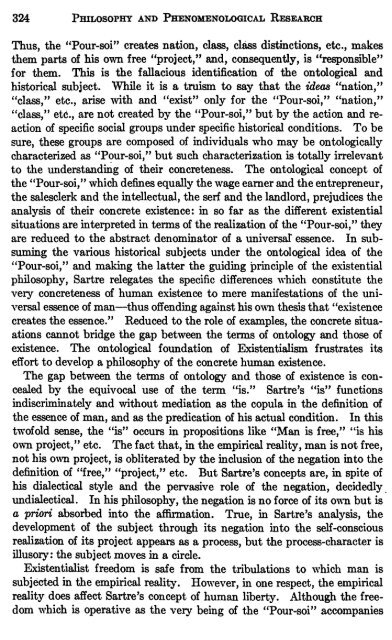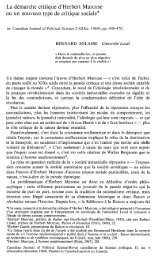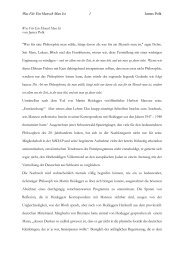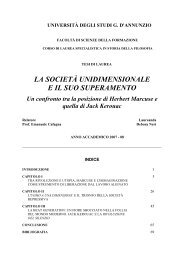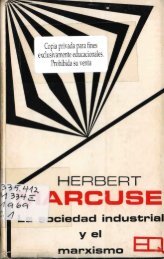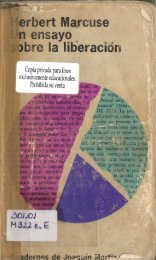Existentialism: Remarks on Jean-Paul Sartre's L'Etre ... - Marcuse.org
Existentialism: Remarks on Jean-Paul Sartre's L'Etre ... - Marcuse.org
Existentialism: Remarks on Jean-Paul Sartre's L'Etre ... - Marcuse.org
Create successful ePaper yourself
Turn your PDF publications into a flip-book with our unique Google optimized e-Paper software.
324 PmLOSOPHY AND PHENOMENOLOGICAL RESEARCH<br />
Thus, the "Pour-soi" creates nati<strong>on</strong>, class, class distincti<strong>on</strong>s, etc., makes<br />
them parts of his own free "project," and, c<strong>on</strong>sequently, is "resp<strong>on</strong>sible"<br />
for them. This is the fallacious identificati<strong>on</strong> of the <strong>on</strong>tological and<br />
historical subject. While it is a truism to say that the ideas "nati<strong>on</strong>,"<br />
"class," etc., arise with and "exist" <strong>on</strong>ly for the "Pour-soi," "nati<strong>on</strong>,"<br />
"class," etc., are not created by the "Pour-soi," but by the acti<strong>on</strong> and reacti<strong>on</strong><br />
of specific social groups under specific historical c<strong>on</strong>diti<strong>on</strong>s. To be<br />
sure, these groups are composed of individuals who may be <strong>on</strong>tologically<br />
characterized as "Pour-soi," but such characterizati<strong>on</strong> is totally irrelevant<br />
to the understandiIig of their c<strong>on</strong>creteness. The <strong>on</strong>tological c<strong>on</strong>cept of<br />
the "Pour-soi," which defines equally the wage earner and the entrepreneur,<br />
the salesclerk and the intellectual, the serf and the landlord, prejudices the<br />
analysis of their c<strong>on</strong>crete existence: in so far as the different existential<br />
situati<strong>on</strong>s are interpreted in terms of the realizati<strong>on</strong> of the "Pour-soi," they<br />
are reduced to the abstract denominator of a universaf essence. In subsuming<br />
the various historical subjects under the <strong>on</strong>tological idea of the<br />
"Pour-soi," and making the latter the guiding principle of the existential<br />
philosophy, Sartre relegates the specific differences which c<strong>on</strong>stitute the<br />
very c<strong>on</strong>creteness of human existence to mere manifestati<strong>on</strong>s of the universal<br />
essence of man-thus offending against his o\"n thesis that "existence<br />
creates the essence." Reduced to the role of examples, the c<strong>on</strong>crete situaati<strong>on</strong>s<br />
cannot bridge the gap between the terms of <strong>on</strong>tology and those of<br />
existence. The <strong>on</strong>tological foundati<strong>on</strong> of <str<strong>on</strong>g>Existentialism</str<strong>on</strong>g> frustrates its<br />
effort to develop a philosophy of the c<strong>on</strong>crete human existence.<br />
The gap between the terms of <strong>on</strong>tology and those of existence is c<strong>on</strong>cealed<br />
by the equivocal use of the term "is." <strong>Sartre's</strong> "is" functi<strong>on</strong>s<br />
indiscriminately and without mediati<strong>on</strong> as the copula in the definiti<strong>on</strong> of<br />
the essence of man, and as the predicati<strong>on</strong> of his actual c<strong>on</strong>diti<strong>on</strong>. In this<br />
twofold sense, the "is" occurs in propositi<strong>on</strong>s like "Man is free," "is his<br />
own project," etc. The fact that, in the empirical reality, man is not free,<br />
not his own project, is obliterated by the inclusi<strong>on</strong> of the negati<strong>on</strong> into the<br />
definiti<strong>on</strong> of "free," "project," etc. But <strong>Sartre's</strong> c<strong>on</strong>cepts are, in spite of<br />
his dialectical style and the pervasive role of the negati<strong>on</strong>, decidedly.<br />
undialectica1. In his philosophy, the negati<strong>on</strong> is no force of its own but is<br />
a priori absorbed into the affirmati<strong>on</strong>. True, in <strong>Sartre's</strong> analysis, the<br />
development of the subject through its negati<strong>on</strong> into the self-c<strong>on</strong>scious<br />
realizati<strong>on</strong> of its project appears as a process, but the process-character is<br />
illusory: the subject moves in a circle.<br />
Existentialist freedom is safe from the tribulati<strong>on</strong>s to which man is<br />
subjected in the empirical reality. However, in <strong>on</strong>e respect, the empirical<br />
reality does affect <strong>Sartre's</strong> c<strong>on</strong>cept of human liberty. Although the freedom<br />
which is operative as the very being of the "Pour-soi" accompanies


